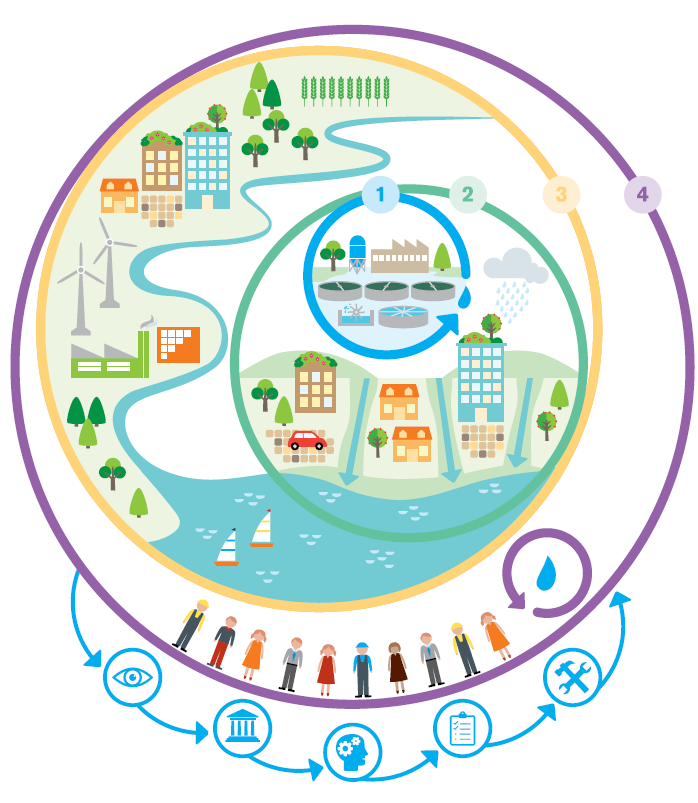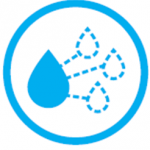Basin-Connected Cities
Urban stakeholders of a water basin play a critical role in preserving the freshwater resources on which they depend. A disruption in the supply of freshwater resources to cities can have significant socio-economic, environmental and health consequences. The challenges are expected to grow in the future, as global projections show a continued increase in urban populations thus improving water security and protecting water resources on which cities rely must be an urgent priority.
The Action Agenda for Basins-Connected Cities outlines the rationale for urban stakeholders to lead the way in realising their role as water stewards and the different pathways and activities towards achieving integrated water resources management. The structure of the Agenda reflects the current and potential issues between cities and their basins and how to deal with them by identifying the drivers for action (e.g. what are the risks?), and the possible solution pathways. It builds a framework of best practice to ensure that the foundations to implement those solutions are in place.
The Action Agenda for Basin-Connected Cities builds on IWA’s Principles for Water-Wise Cities, which aim to integrate water in planning across scales. The Principles
support city leaders planning a future-proof access to safe water and sanitation for everyone in their cities, while delivering enhanced liveability for people and nature. The Principles include 4 levels of action:
 |
1. Regenerative Water Services
2. Water Sensitive Urban Design 3. Basin Connected Cities 4. Water-wise Communities |
The Action Agenda for Basin-Connected Cities acknowledges that the city is intrinsically connected to, and dependent on, its surrounding basin(s). Proactive engagement in managing water resources in the basin can help to secure water, food and energy resources, reduce flood and drought risk and enhance activities contributing to the economic and environmental health of the basin. Based on a comprehensive understanding of our water resources today, and the level of uncertainty resulting from climate change impacting our future resources, we need to:
- Secure the water resource
- Protect water quality
- Prepare for and respond to extreme events
Drivers for Action
The top three risks for cities are extreme events such as flooding, declining water quality, and challenges to water availability due to increasing water stress and scarcity. Solving the root problems risks can be supported by urban stakeholders. For each of the risks a set of impacts on the urban areas can be identified, which drive a need for action.
Pathways to Action
The Agenda is intended as a starting point for urban stakeholders to identify the actions that need to be taken to address the risks, how to ensure sustainable management of basins in the future and how to more actively participate in water governance. The following pathways for action (assessment, planning and implementation) respond to the impacts outlined in the drivers for action to connect cities and their basins.
| Assessment | Planning | Implementation | ||
 |
 |
 |
||
| Invest in values that will motivate water decision-making within the basin
_ Investment in data, information systems, research and expertise within and beyond city limits _ Linking traditional water management with science in a way that builds and reflects on local knowledge and needs |
Risk-based approach to planning linking urban stakeholders with their catchment
_ Water allocation mechanisms to share water resources between different users _ Aligning urban development with basin management _ Stakeholder participation in planning and management |
Application of economic and financing mechanisms
_ Integration of nature-based solutions to improve catchments _ Building partnerships from catchment to tap to catalyse action in sustaining and improving water quality and flows to and from cities _ Using digital technologies to support availability and access of information _ Customisation of solutions as there is no one size fits all solution |
Foundations for Action
The building blocks of the Principles for Water-Wise Cities are the foundations for the pathways to action to deliver sustainable urban water management – including vision, governance, knowledge and capacity, planning tools, and implementation tools. These have been adjusted to reflect connecting cities with their basins. Not all building blocks are applicable as cities and their stakeholders are at different stages.
 |
Vision
A vision commonly shared with stakeholders provides an overall framework defining long-term ambitions, values and aspirations |
 |
Governance
Governance and institutions provide the framework for stakeholders to work together from catchment to tap to achieve a joint vision |
 |
Knowledge and capacities
Building process starts with understanding what are the current competencies and capacities for urban stakeholders to effectively contribute to basin management |
 |
Planning tools
Inclusion of planning tools such as decision support systems, integrated water resource management plans, as well as risk-based and rights-based approaches that can support the alignment of urban development with basin management |
 |
Implementation tools
Moving from concept to reality to put planning into action, which improves water quantity and quality, as well as food and energy security. Tools for implementation include:
|
Who should take action?
The Action Agenda targets multiple stakeholders with different roles in taking action in improving their water sources and watersheds including water and wastewater
utilities, city governments, industry, policy makers and regulators. These primary stakeholders work with basin organisations, water resources agencies, civil society
and environmental groups to ensure equitable and effective water management. The secondary audience includes stakeholders that use water in basins which cities rely on for their water security such as agriculture, energy, natural resource extraction and other business interests. All parties need to actively work together to ensure water across sectors from catchment to consumer.
Basin Stories
We are collecting stories from urban stakeholders that are leading the way in strengthening the connection with their catchments through different actions and pathways to contribute to the development and promotion of the Action Agenda for Basin-Connected Cities. Discover the Basin Stories!
Contribute a Basin Story which outlines the successes and challenges that urban stakeholders have experienced in becoming water stewards in the wider catchment.











